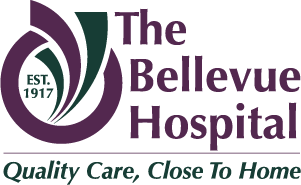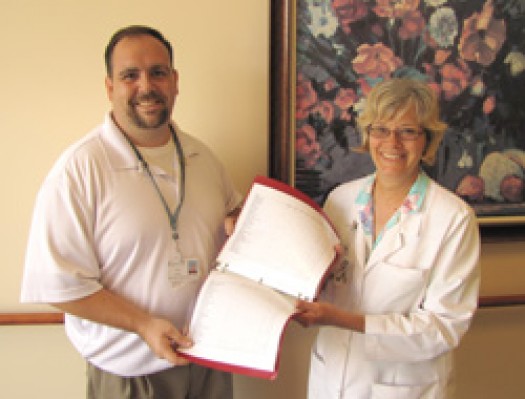For those affected by food allergies, breakfast, lunch and dinner can be very stressful events, especially when ingesting even a small amount of food allergens can result in illness.
The Bellevue Hospital’s (TBH) Dietary Department is helping to make sure those who dine in TBH’s Main Station Café have a pleasant experience and all the food allergen information they need.
The Food Allergy Reference Manual is now available in the Café. TBH Dietary Department Leader Joe Hoff, Registered and Licensed Dietician Patti Keller, and the Dietary Department staff spearheaded the project, which took over six months to complete.
“A food allergy is a reaction of the body’s immune system to a food or an ingredient in food – usually a protein,” explained Keller. “Health department personnel have recommended that food service locations begin offering food allergy information to customers, and many restaurants have started listing food allergy information on their menus.”
Added Keller, “Although our inpatients have had food allergy information available for years, this is the first time we have offered that same information to our Main Station Café customers.”
According to Keller, there are eight main food allergens, including milk, eggs, peanuts, tree nuts, soy, wheat, fish, and shellfish.
"The reference manual will make our guests and staff more aware of the growing epidemic of food allergies, and will inform them of what products we serve that have a potential allergy risk,” added Hoff.
Common symptoms of food allergies may include tingling in the mouth, hives, itching or eczema, swelling of the lips, face, tongue and throat, wheezing, nasal congestion or trouble breathing, abdominal pain, diarrhea, nausea or vomiting, and dizziness, lightheadedness or fainting. Symptoms can occur almost immediately, or can be delayed for up to two hours, and symptoms can vary from person to person.
The reference manual lists all the foods served in the Main Station Café, and is constantly being updated as new foods or items are added to the menu. “During the research process, we checked labels of every food item coming off the truck into our kitchen,” explained Keller. “We were looking for any of those eight main food allergens.”
Keller and Hoff held inservices for dietary staff members to educate them on what to do if someone exhibits signs of a food allergy. The staff was also instructed on thoroughly washing food equipment that comes in contact with food allergens, and to watch for other sources of “cross contact” such as cooking oil, splatter, and steam from food.
Food allergies affect one in every 25 kids, and 12 million Americans suffer from some type of food allergy problem, including food sensitivities and food intolerance.
“Individuals with food allergies should always read the list of ingredients on food labels,” continued Keller. “This is important because manufacturers often change ingredients in their products. When reading labels, look for the allergen statement such as ‘Contains wheat, milk and egg ingredients.’”
Finalized Keller, “It is not easy to know how each and every food product was manufactured. For instance, a sugar cookie may be made on the same line, using the same equipment, as a peanut butter cookie. Therefore, there is a chance that peanuts or peanut dust may have come in contact with the sugar cookie. In this scenario, merely 1/50th of a peanut may cause a severe reaction in a food allergic person.”
The Food Allergy Reference Manual is available for viewing upon request at TBH’s Main Station Café during normal breakfast, lunch and dinner hours. Any other questions about the manual or food allergies can be directed to Patti Keller, RD, LD, CDE, at 419.483.4040, Ext. 4214.

